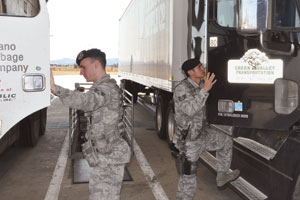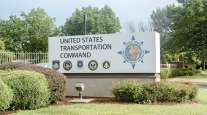Truck Delays at Military Bases Concern Industry Executives

By Eric Miller, Staff Reporter
This story appears in the June 1 print edition of Transport Topics.
Truck drivers servicing U.S. military installations are increasingly being required to undergo additional lengthy background and security checks before gaining entry, extensively delaying deliveries and pickups, industry executives have said.
The security checks can delay up to three hours even those drivers holding Transportation Worker Identification Credentials or secret-level clearances, Bill Graves, president of American Trucking Associations, said in a letter to Defense Secretary Ashton Carter.
“While the hundreds of carriers serving DOD recognize the need for security, they also have identified DOD’s redundant vetting of drivers as their number one concern when accepting DOD freight,” Graves wrote.
A U.S. Transportation Command spokesman did not respond to requests for comment.
However, Lt. Col. Tom Crosson, spokesman for the Office of Secretary of Defense, said the TWIC is a baseline validation, but commanders of each base are ultimately responsible for security procedures.
Retired Navy Rear Adm. Mark Buzby, president of the nonprofit National Defense Transportation Association, also expressed concerns over the delays in a letter to Air Force Gen. Paul Selva, commander of the U.S. Transportation Command, and David Berteau, assistant secretary of defense logistics and material readiness.
The National Defense Transportation Association facilitates sharing of knowledge between the government and transportation- and distribution-related industries.
Buzby asked Selva and Berteau to recommend that Carter “provide direction to the services to accept the TWIC,” said Rebecca Jones, Buzby’s executive assistant.
To obtain a TWIC, a driver must present documents proving U.S. citizenship, provide a digital fingerprint and undergo an FBI criminal background check and security threat assessment.
Delaying drivers presenting TWICs to undergo more background checks as well as terrorist watch-list checks “retards logistical velocity and readiness, and drives up costs,” said Graves.
ATA said it has not yet received a response to his letter.
The TWIC is one of a handful of credentials listed in a 2009 DOD enterprisewide policy directive to accept the TWIC and the military’s Common Access Card to “facilitate physical access to installations” by visitors who have a valid purpose to enter, such as a bill of lading.
“Persons in possession of these identification cards and/or credentials shall be considered vetted for unescorted access for the purposes of this DTM [Directive-Type Memorandum],” said the policy guidance issued by then-Undersecretary of Defense James Clapper.
The security delays, which also can affect hours-of-service limitations, are forcing motor carriers to conduct a “value assessment” of DOD freight against the risks associated with the delays, Graves said.
John Collins, executive vice president of specialized freight services for Landstar System Inc., said the delays are experienced by less-than-truckload and truckload carriers, household goods movers and even transportation protective service drivers with security clearances who haul DOD munitions.
“Yet their access to the base is inconsistent because each base is allowed to initiate their own procedure and process for allowing access to the base,” Collins told Transport Topics. “So as an industry, you never really know what’s going to be required of your drivers when you are trying to gain access to a base.”
The industry’s goal is to get the TWIC card universally accepted at all 700 military installations, said Collins, who is also chairman of the National Defense Transportation Association’s Surface Transportation Committee.
“The TWIC card is federally approved, and we’re trying to get that card accepted,” Collins added. “Certainly, we understand the critical need for the safety of the base, the employees and service men and women and their families. But give us something we can plan by.”
Leland Karras, former ABF Freight executive director of government accounts and current consultant for the company, said the delays have been a continuing issue.
“It is a critical issue for carriers because it costs us a lot of money,” Karras told TT. “The problem we have is that security is up to the base commander. So each commander can set their own standards. What we’ve been trying to do is to get the Department of Defense to say here’s a credential that’s accepted by all.”
Karras said an LTL driver loads up and has predesignated stops.
“If that driver gets delayed for three or four hours, you just missed deliveries and pickups,” Karras said. “That causes the carrier to send another driver to cover the pickups. Now I’ve got two drivers doing what should have been done by one, so it drives our costs up.”
Likewise, truckload drivers generally get paid by the mile.
“Those guys only make money when they’re driving down the road,” Karras said. “Plus, if they’re sitting at that gate they could run out of hours.”




